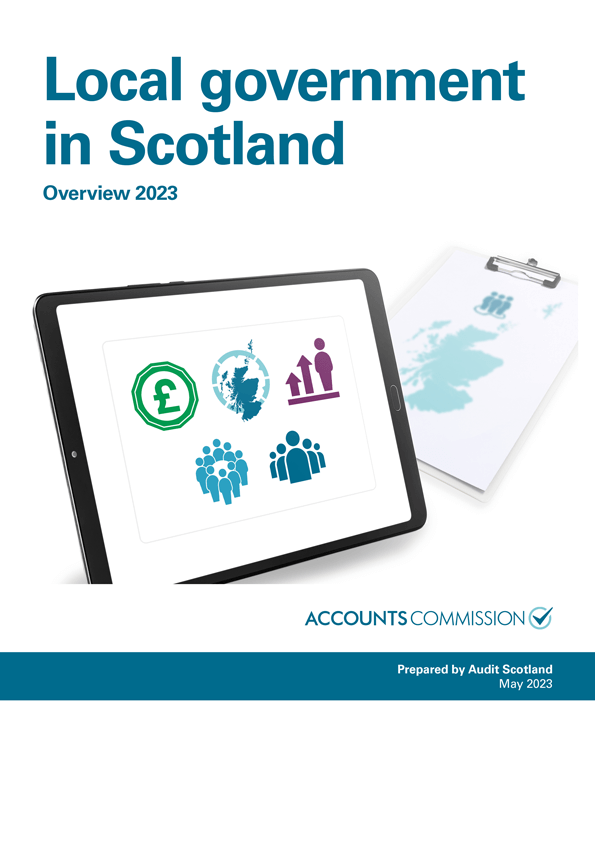Publication: Local government in Scotland: Overview 2023
Radical change is needed across Scotland's councils
Councils have never faced such a challenging situation.
In this year's Accounts Commission's overview of local government, we report that demand and workforce pressures have been deepening after the pandemic and funding is forecast to reduce in real terms.
Radical change, through greater collaboration, is urgently needed if councils are to maintain services.
The pandemic has affected performance across all service areas.
There are signs of growing backlogs and performance getting worse in some service areas.
Performance at risk or declining

Adult social care
There are signs that the sector is in crisis, with growing backlogs, declining satisfaction and no clear picture of demand or unmet need.

Housing and homelessness
Housing performance indicators fell during the pandemic as a result of increasing financial hardship and Covid-19 restrictions limiting access to properties.
During the first year of the pandemic homelessness fell as a result of emergency extra protections but it is rising again.

Environmental services
Performance declined during the pandemic, including a drop in recycling rates and street cleanliness levels.

Culture and leisure
Services were severely affected by the pandemic and future risks are significant.
Performance mixed or recovering

Children's services
Performance during the pandemic was mixed, attainment and progress towards closing the poverty-related attainment gap stalled but has shown some recovery.

Economic development and tourism
Performance declined during the first year of the pandemic, as activity was refocused on Covid-19 financial support, but shows signs of recovery.
Performance maintained

Corporate services
Performance dipped slightly but activity significantly increased, as corporate support services had a critical role in delivering Covid-19 grants, supporting financial hardship and facilitating homeworking for councils' workforce.
Notes:
Indicators capture national performance before the recent cost-of-living crisis and inflationary cost pressures.
Source: Selected indicators from the Improvement Service's Local Government Benchmarking Framework, 2021/22, and Scottish Government's homelessness statistics, 2021/22
The Improvement Service publishes information to help members of the public understand how well their council is performing across a range of council services. You can find more about your own council's performance here.
Some communities are facing crisis
Levels of poverty remain high, financial hardship is increasing and mental wellbeing levels have declined.
- 24% of children were living in poverty during 2019–22
- More than two-thirds of children in poverty live in working households
- Rent arrears have increased to £101.06m in 2021/22
- 8,635 children and 13,945 households in temporary accommodation
- Low-income households and people already experiencing inequalities are most affected.
- Our population is also getting older. Life expectancy and healthy life expectancy are falling.
Councils face significant challenges too
Pressures are deepening after the Covid-19 pandemic rather than easing.
Finances
Costs are going up and the amount of money councils receive to run services is set to get less.
Local needs
Changing demographics, the pandemic and the cost-of-living crisis increase pressure on council services at a time when councils have less capacity to support them.
National policies
As well as focusing on providing local services councils must help to tackle national issues such as climate change, child poverty and inequalities.
Workforce
Councils are finding it difficult to recruit the staff they need to run some services, in particular social care. There are also high sickness absence levels.
Leadership
Some councils don't have strong leadership or have a high turnover of senior staff.
Communities need to get involved
Councils need to work with local people and be open about the need for change. This will affect the way services are provided in the future.
Communities must be involved in these conversation and work with councils to make difficult choices about the future of their local services.
Action is needed now
Councils need to radically rethink how they can work together, and with local partners, to provide services and meet wider ambitions to tackle climate change, child poverty and inequalities.
This could mean councils working together to provide services.
Councils also need to better understand the experience of service users, and work with communities to redesign services.
Councils need to build on the many innovative ways of working seen during the pandemic. To deliver sustainable services, councils need:
 flexible funding and resources
flexible funding and resources driven leadership
driven leadership greater collaboration
greater collaboration a resilient workforce
a resilient workforce a focus on community needs and inequalities
a focus on community needs and inequalities
To support improvement, we have developed two supplements for councils:
- a collection of case studies to illustrate issues and practice across councils
- a checklist with questions for elected members, to help in their scrutiny and decision-making roles and in their work with council executives.
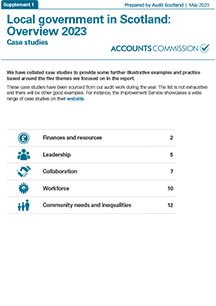
Supplement 1:
Case studies
May 2023
The New Deal for local government
is long overdue. It will give councils longer-term financial stability, supporting them to make decisions and make the fundamental changes urgently needed.Tim McKay Acting Chair of the Accounts Commission
Related reports
This report follows the first two reports in the series.
Each year we publish a financial overview. The most recent one was published in January 2023.
- File type:
- File size:
- 896.08 KB
All files
- Supplement 1
- File type:
- File size:
- 254.99 KB
- Supplement 2
- File type:
- File size:
- 132.38 KB
- Audiogram transcript
- File type:
- - rtf
- File size:
- 95.38 KB
- News release
- File type:
- File size:
- 158.84 KB
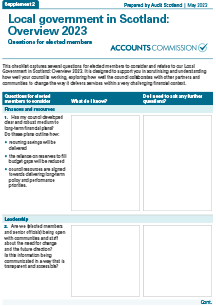
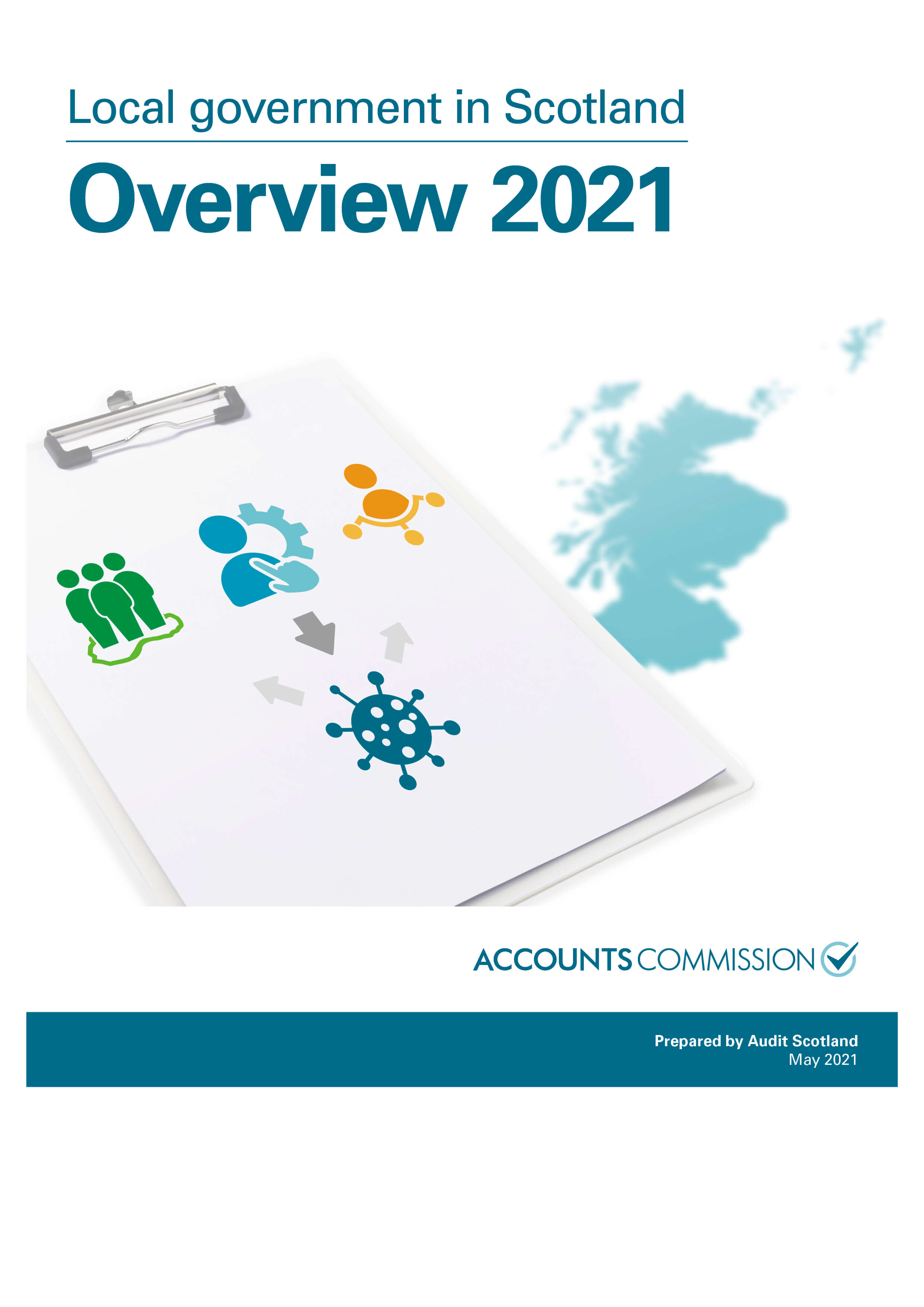 Local government in Scotland: Overview 2021
Local government in Scotland: Overview 2021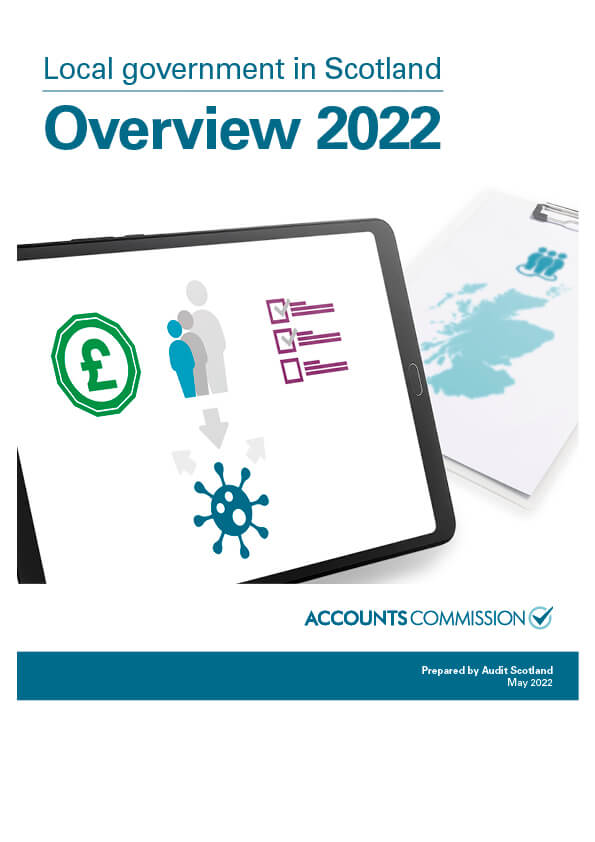 Local government in Scotland: Overview 2021
Local government in Scotland: Overview 2021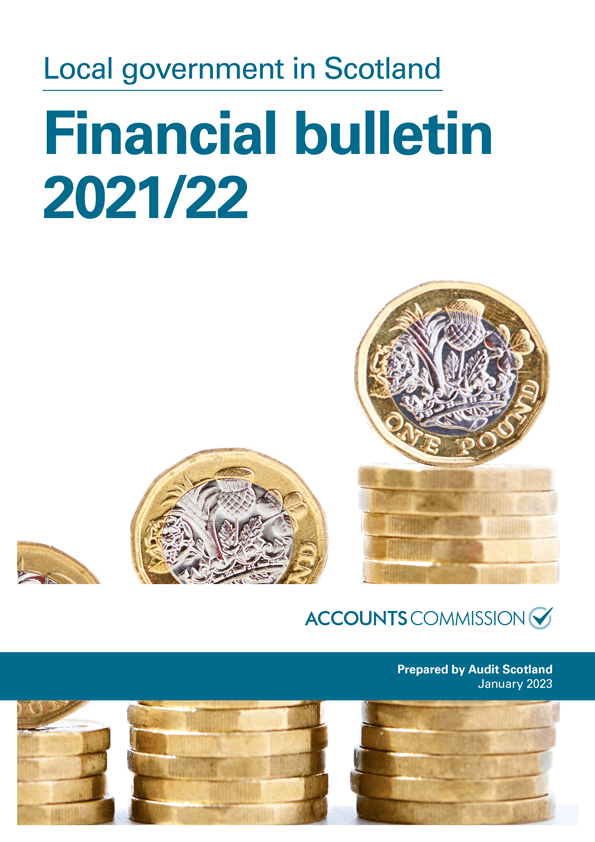 Local government in Scotland: Financial bulletin 2021/22
Local government in Scotland: Financial bulletin 2021/22